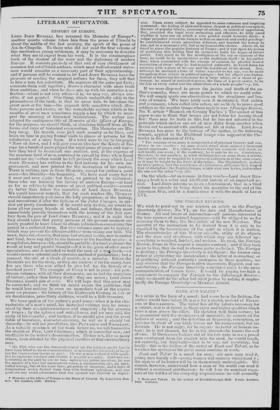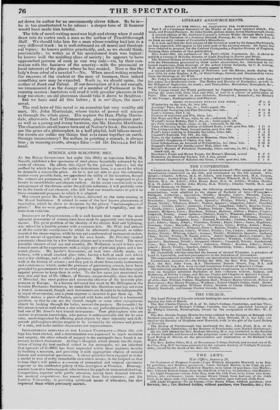RANK AND TALENT it
Is a satire in the form of a novel : had verse been the fashion, the author would have taken HenAcz for a model, instead Of FIELD- ING or RICHARDSON. Time writer has all the talents necessary for a satirist, and is deficient in those other and higher qualities which raise a man above the office. He sketches well from nature • he is acquainted with the weaknesses of mankind ; he sounds all the hollows of society ; and the detection of hypocrisy, corruption, or pretence in short of any kind, moves not his compassion, but his derision. He is not for he expects no better of human na- ture: he is not pleased, ler he is too shrewd—be knows the evil of vice. If Dwain:as looking out of his tub were to see a proud man overturned from his chariot into the mud, he would laugh, not cynically, but hippically—that is to say, not snortishiy, but loudly : this is the feeling of the writer of bank and Talent, as he watches the springs of the great social machine at work.
Rank and Talent, is a novel for men: old men may read it, young men hardly will—young women will scarcely understand it ; the slyness of its banter will be to them utterly unintelligible. We cannot, however, understand how a man of the world can read it without a continued gratification : he will love its constant expo- sure of the foibles of his every-day acquaintance: he will assuredly
* Rank and Talent. By the author of Truckleborough Ha% 3 vols. London, 182). Colburn. set down its author for an uncommonly clever fellow. So Ws— he is too goodnatured to be odious : a deeper tone of ill humour would have made him hateful.
The tide of novel-writing must run high and strong when it could draw into its vortex such a man as the author of Truckleborough Hall. We should take him for a man whose reading had lain in a very different track : he is well-informed on all moral and. theologi- cal topics : he knows politics practically, and, as we should think, provincially ; he writes as if his accustomed train was logical : he knows well the middling class of society ; he appears to have approached persons of rank in one way only—viz. by their con- nexion with the business of the country—with the provincial or local interests of the places where he has resided. Now is this the lady's beau-ideal of a novelist ?—No. When novel-writing reaches the recesses of the student or the man of business, then indeed something new may be expected. Such is, we should opine, the author of Rank and Talent. If our description of it is not enough, we. recommend it as the lounge of a member of Parliament in the ensuing session : banisters will read it with peculiar pleasure in the long vacation ; an old placeman should take it down to Brighton :
but we have said all this before ; it is za.?!np, the man's novel.
The real hero of this novel is an eccentric but very wealthy old man, Mr. John Martindale, whose tricks of power will amuse us through the whole piece. His nephew the Hon. Philip Martin- dale, afterwards Earl of Trimmerstone, plays a conspicuous part ; as well as a young and rising barrister, one Mr. Horatio Markham. The characters are all leaves torn out of Nature's book : the remarks are the grins of a philosopher, in a half playful, half bilious mood : the events are unlike any things that ever came together on earth. Strange inconsistency the author, in pointing a remark, is always true ; in weaving events, always false :—let Mr. DEVILLE feel his head. .



















 Previous page
Previous page